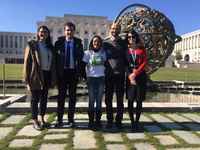Community representative informs UN Special Procedures on lack of advancement in case of over 300 families victim of pollution in Piquia de Baixo, Brazil
On February 27th , Ms. Joselma de Oliveira, a Brazilian activist representing over 300 families of the Piquia de Baixo community, all victims of the pollution caused by the mining and steel industries settled in Açailândia (State of Maranhão, Brazil) 20 years before, submitted information and a general update on the situation to the United Nations Special Rapporteurs who had taken action on this case and to the Permanent Mission of Brazil at the UN.
She pointed at the lack of concrete measures being taken to reduce the devastating effects of the ongoing pollution on community members’ health, and at the lack of progress regarding other remedial measures part of the resettlement plan signed between the State, the affected community and the companies involved that has yet to materialize. She was helped in delivering her testimony by representatives of the International Federation for Human Rights (FIDH), and by the Comboni Missionary Dário Bossi, member of the “Churches and Mining” network.
Following this meeting, Ms. Joselma de Oliveira and Mr. Dário Bossi will carry on their advocacy journey in Europe with two other meetings. First they will discuss the health consequences of iron production with the Istituto dei Tumori, an European institution researching about illnesses consequences of the pollution. The institution has been asked by Piquia de Baixo local association to conduct a study about the people health conditions . Then, they will be meeting with the Cardinal Peter Turkson, President of the Dicastery for Promoting Integral Human Development, regarding the possibilities for support to all the communities suffering violent impacts due to mining operations in Latin America.
More information on the case:
Piquiá de Baixo is a village of about 1.100 inhabitants, in Maranhão State, where high levels of polluting emissions and contaminated water are released by the iron and steel industries operating in the vicinity of the community’s houses.
For over twenty years, the local dwellers have been victims of respiratory illnesses, eye and skin illnesses, cancer and different kinds of accidents due to these industrial activities undertaken without respecting any health or safety measures.
For the past ten years, the community of Piquiá de Baixo has been struggling to demand immediate remedies, mitigation of the pollution and collective resettlement in a clean and healthy area.
FIDH, Justiça Global and Justiça nos Trilhos published a joint report [1] touching on the case of the Piquiá de Baixo community in 2011, and have been since then supporting the community to seek accountability and redress for the violations identified.
In 2014 UN Special Procedures and the Working Group on the issue of human rights and transnational corporations and other business enterprises sent a joint letter to the Brazilian Government requesting information about the serious human rights violations affecting the community.
[1] How much are human rights worth in the Brazilian mining and steel industry? The human rights impacts of the steel and mining industry in Açailândia, Justiça nos Trilhos, Justiça Global and FIDH, May 2012
For information and contacts:
Fr. Dário Bossi
Whatsapp: +39 327 235 6095
Place à laquelle s'applique cet article
Commentaires
%login_link_starAuthentifiez vous ou créez un nouveau compte utilisateur pour commenter.

